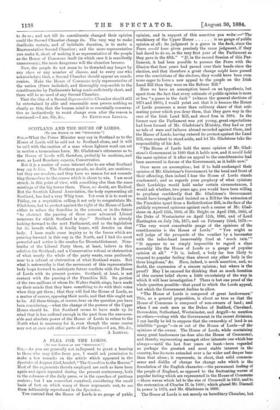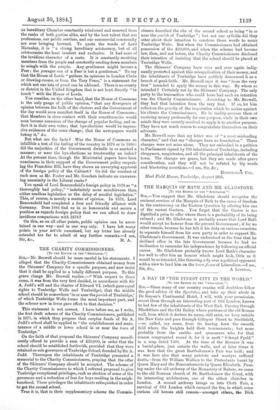A PLEA FOR THE LORDS.
[To TILE EDITOR OF THE " SPECTATOR."] SIR,—AS you are generally not indisposed to grant a hearing to those who may differ from you, I would ask permission to make a few remarks on the article which appeared in the Spectator of August 23rd, headed, " The Guardian to the Rescue." Most of the arguments therein employed are such as have been again and again repeated during the present controversy, both in the columns of the daily press, or in the speeches of partisan orators ; but I am somewhat surprised, considering the small basis of fact on which many of those arguments rest, to see them deliberately reproduced in the Spectator.
You contend that the House of Lords is no gangs of public opinion, and in support of this assertion you write :—" The
machinery of the Upper House is no gauge of public opinion at all; its judgment is a guess in the dark, since the Peers would have given precisely the same judgment, if they had dared to do so, in the very first year of the Parliament as they gave in the fifth." "If, in the second Session of this Par- liament, it had been possible to possess the Peers with the- illusion that four years had passed over their heads since the election, and that therefore a great change might have passed over the convictions of the electors, they would have been even more eager to force a new appeal to the people on the Irish Land Bill than they were on the Reform Bill."
Here we have an assumption based on an hypothesis, but apart from the fact that every estimate of public opinion is more or less "a guess in the dark" (witness the general elections of 1874 and 1880), I would point out that it is because the House of Lords possesses a more than ordinary share of that esti- mating power which you deny them, that they gave way in the case of the Irish Land Bill, and stood firm in 1884. In the former case the Parliament was yet young, great expectations had been formed of Mr. Gladstone's Ministry, they had as yet no tale of wars and failures abroad recorded against them, and the House of Lords, having entered its protest against the Land Bill, were content to stand aside, and let Mr. Gladstone take the responsibility of his Act.
" The House of Lords held the same opinion of Mr. Glad- stone's Government in 1880 that it holds now, and it would hold' the same opinion of it after an appeal to the constituencies had been answered in favour of the Government, as it holds now."
Once more an assumption; but if to hold unchanged their opinion of Mr. Gladstone's Government be the head and front of their offending, then indeed I fear the House of Lords stands condemned ; and as regards your prophecy of what opinions their Lordships would hold under certain circumstances, / would ask whether, two years ago, you would have been willing to prophesy confidently that Mr. Gladstone's Government would have brought in and insisted on a Bill for the extension of the Franchise apart from a Redistribution Bill, in the face of the publicly expressed opinions against such a course of Mr. Glad- stone on April 12th, 1866, of Mr. Bright on April 19th, 1866, of the Duke of Westminiter on April 12th, 1866, and of .Lord: Hartington on July 7th, 1875, and on February 22nd, 1878 :— " The very worst conceivable gauge of the opinions of the constituencies is the House of Lords." " You might as well judge of the prospects of the weather by a barometer' with the index-hand immoveably fixed at much rain.'" "It appears to us simply impossible to regard a class assembly like the House of Lords as a gauge of popular opinion at all." " It is, indeed, a body far less likely to respond to popular feeling than almost any other body in the three kingdoms," &c. Here, indeed, is much assertion, and, no doubt, the expression of a sincere opinion; but where is the P May I be excused for thinking that so much iteration of this earnest belief shows a little uncertainty of the way in which it will bear investigation ? There is but one proof of the whole question possible—that proof to which the Lords appeal, but which the Government decline to allow.
"The House of Lords is composed of great landowners." This, as a general proposition, is about as true as that the House of Commons is composed of non-owners of land ; and. when I see such men as the Dukes of Bedford, Cleveland, Devonshire, Sutherland, Westminster, and Argyll—to mention no others—voting with the Government in the recent divisions, I can hardly be led to suppose that the ownership of land is an infallible " gauge "—in or out of the House of Lords—of the opinions of the owner. The House of Lords, while containing many great landowners (as does also the House of Commons), and thereby representing amongst other interests one which has always—until the last four years at least—been regarded as perhaps the greatest and most stable interest in the country, has its roots extended over a far wider and deeper base than that alone ; it represents, in short, that solid common- sense and dislike of change for change sake which is the foundation of the English character.—the permanent feeling of the people of England, as opposed to the fluctuating waves of popular feeling which are represented in the House of Commons —those waves which led to the rise of Cromwell in 1653, and to the restoration of Charles II. in 1660 ; which placed Mr. Disraeli in power in 1874, and Mr. Gladstone in 1880.
The House of Lords is not merely an hereditary Chamber, but
an hereditary Chamber constantly reinforced and renewed from the ranks of both parties alike, and by the best talent that our professions, our public services, and our commercial community are ever bringing forward. To quote the words of Lord Macaulay, it is " a strong hereditary aristocracy, but of all aristocracies the least insolent and exclusive. It had none of the invidious character of a caste. It is constantly receiving members from the people and constantly sending down members to mingle with the people. Any gentleman might become a Peer ; the younger son of a Peer is but a gentleman." To say that the House of Lords " gathers its opinions in London Clubs or drawing-rooms, or from the Tory Press," is a statement for which not one iota of proof can be adduced. There is no county or district in the United Kingdom that is not kept directly " in touch " with the House of Lords.
You consider, on the other hand, that the House of Commons is the only gauge of public opinion, " that any divergence of -opinion between the bulk of the electors and the Government of the day would soon manifest itself in the House of Commons ; that Members in close contact with their constituencies would soon become conscious of the change of popular feeling, and re- flect it in their own votes ; that bye-elections would be impres- sive evidences of the same change; that the newspapers would betray it," &c.
But what are the facts ? Was the House of Commons so infallible a test of the feeling of the country in 1874 or in 1880 did the majorities of the Government dwindle in so marked a manner; or were the bye-elections so trustworthy an index ? At the present time, though the Ministerial papers have been unanimous in their support of the Government policy respect. ing the Franchise Bill, have they shown an unvarying approval of the foreigu policy of the Cabinet ? Or did the conduct of such men as Mr. Foster and Mr. Goschen indicate an unwaver- ing unanimity in the Liberal ranks ?
You speak of Lord Beaconsfield's foreign policy in 1878 as " a -thoroughly bad policy," "indefinitely more mischievous than. either needless legislation or the delay of needful legislation." This, of course, is merely a matter of opinion. In 1878, Lord Beaconsfield had completed a firm and friendly alliance with .Germany. Does 1884 find us in so honourable and secure a position as regards foreign policy that we can afford to draw invidious comparisons with 1878?
On this, as on all other points, public opinion can be ascer- tained in one way—and in one way only. I have left many points in your article unnoticed, but my letter has already ,extended too far to admit of any further remarks.—I am,



































 Previous page
Previous page